Unit 5 Wild animals讲练课件(共84张PPT)
文档属性
| 名称 | Unit 5 Wild animals讲练课件(共84张PPT) |
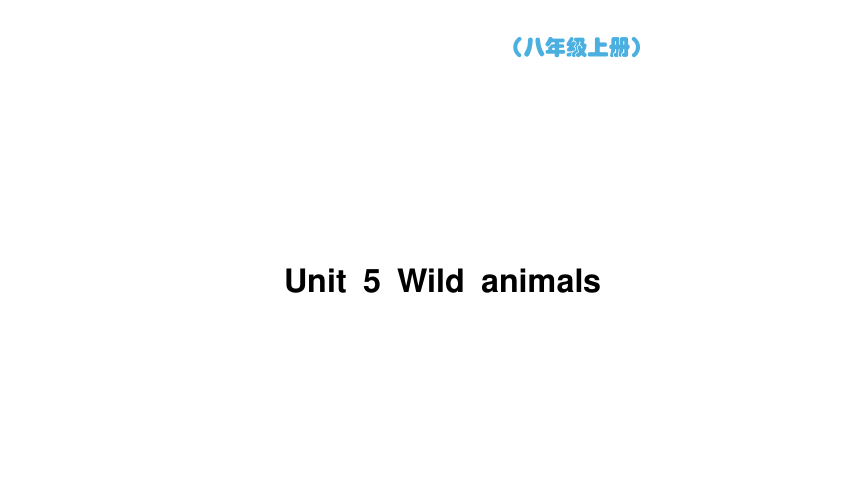
|
|
| 格式 | pptx | ||
| 文件大小 | 570.2KB | ||
| 资源类型 | 教案 | ||
| 版本资源 | 牛津译林版 | ||
| 科目 | 英语 | ||
| 更新时间 | 2024-05-22 00:00:00 | ||
图片预览


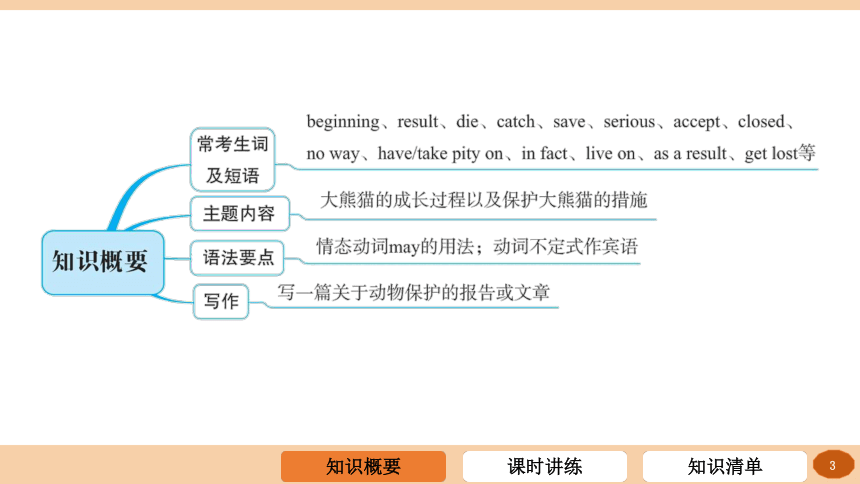

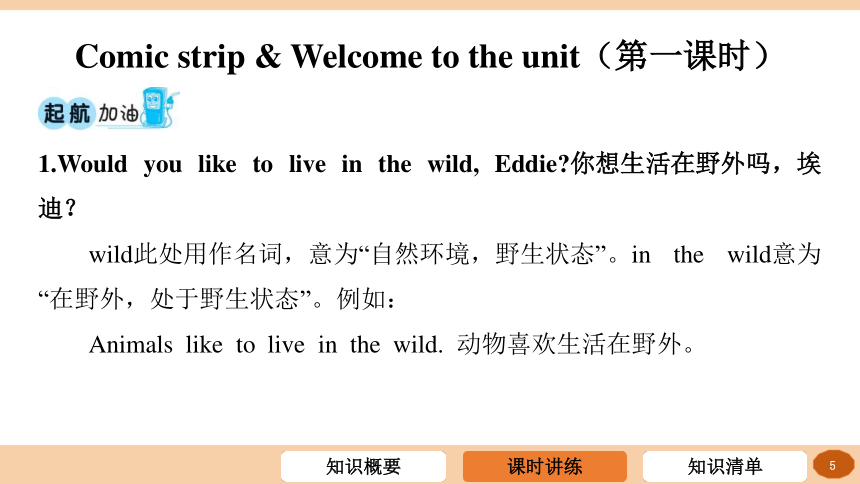
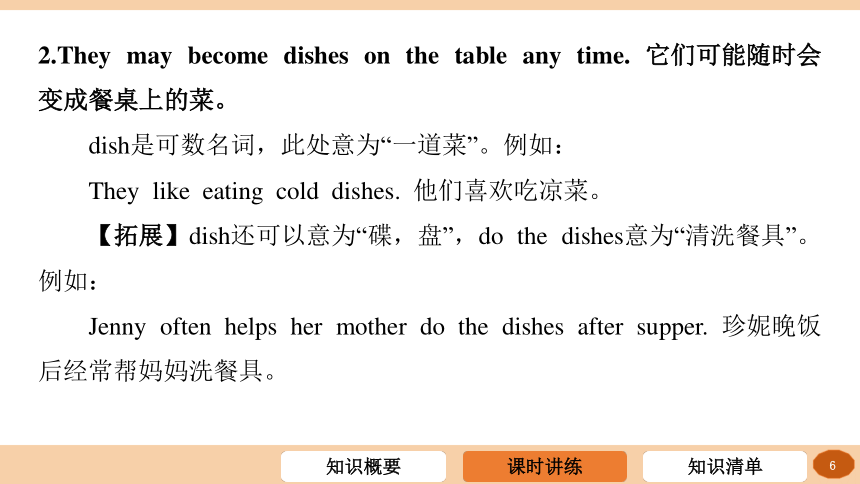

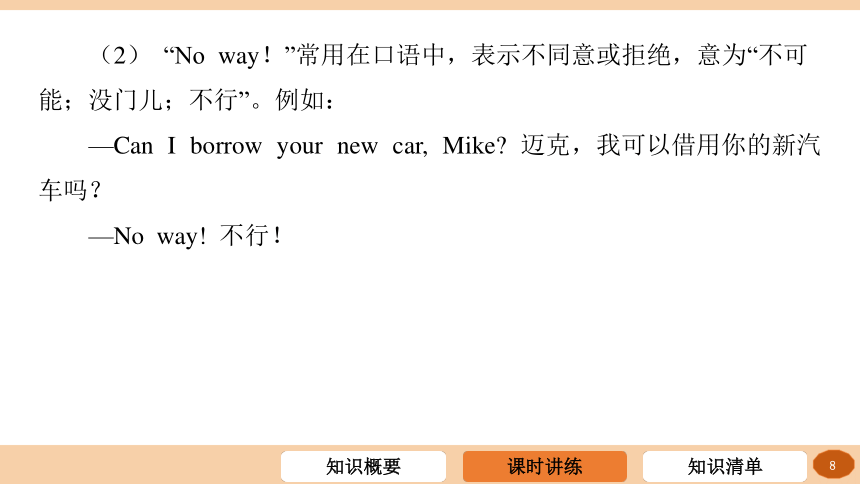
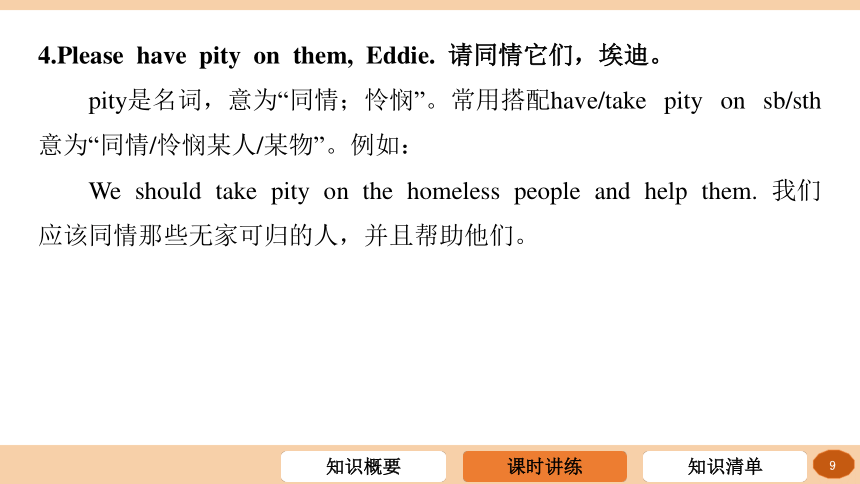
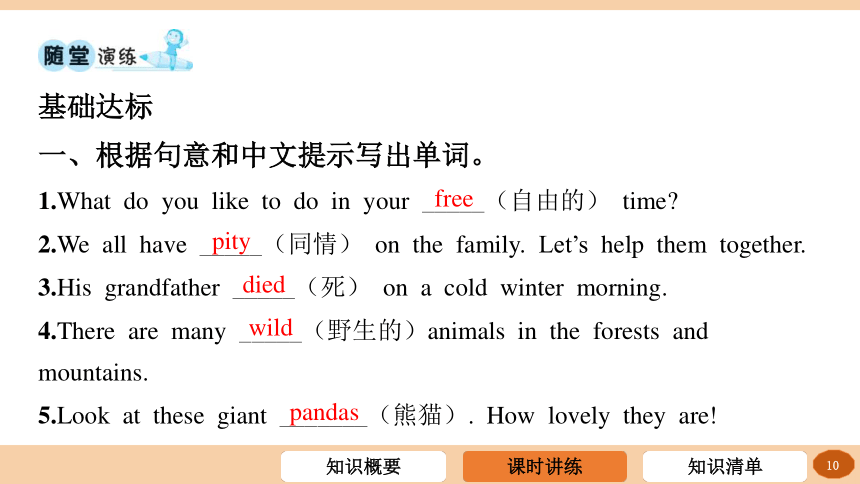
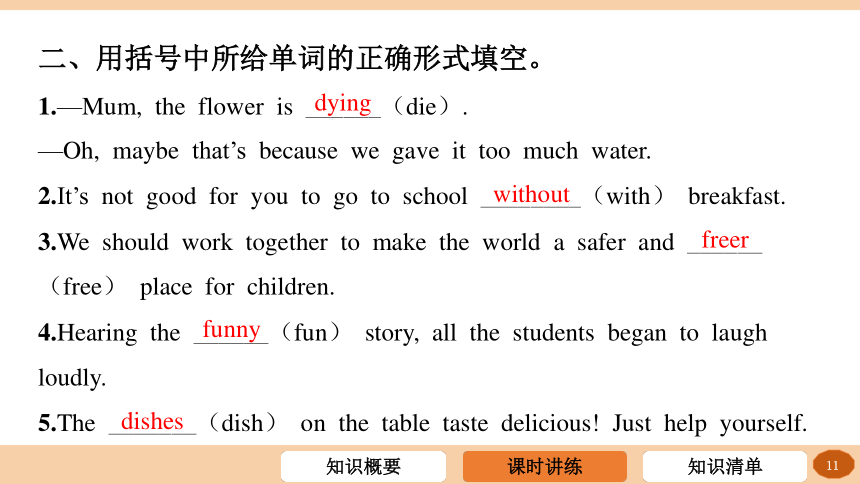
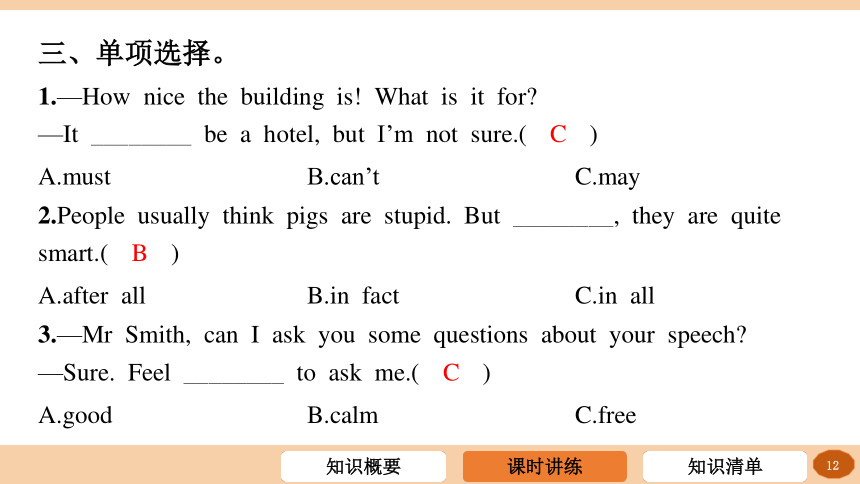
文档简介
(共84张PPT)
Unit 5 Wild animals
知识概要
课时讲练
1.Would you like to live in the wild, Eddie 你想生活在野外吗,埃迪?
wild此处用作名词,意为“自然环境,野生状态”。in the wild意为“在野外,处于野生状态”。例如:
Animals like to live in the wild. 动物喜欢生活在野外。
Comic strip & Welcome to the unit(第一课时)
2.They may become dishes on the table any time. 它们可能随时会变成餐桌上的菜。
dish是可数名词,此处意为“一道菜”。例如:
They like eating cold dishes. 他们喜欢吃凉菜。
【拓展】dish还可以意为“碟,盘”,do the dishes意为“清洗餐具”。例如:
Jenny often helps her mother do the dishes after supper. 珍妮晚饭后经常帮妈妈洗餐具。
3.—So could you please not eat them 那么,你能不吃它们吗?
—No way! 不可能!
(1) “Could you please+动词原形(+其他)?”意为“请你……好吗?”。该句型表示请求,语气较委婉,相当于“Would you please+动词原形(+其他)?”。其否定形式是“Could you please not+动词原形(+其他)?”,意为“请你不要……好吗?”。肯定回答常用“Sure./Of course./No problem.”,否定回答常用“Sorry, but I...”等。例如:
—Could you please give me a hand 请你帮我一下好吗?
—No problem. 没问题。
(2) “No way!”常用在口语中,表示不同意或拒绝,意为“不可能;没门儿;不行”。例如:
—Can I borrow your new car, Mike 迈克,我可以借用你的新汽车吗?
—No way! 不行!
4.Please have pity on them, Eddie. 请同情它们,埃迪。
pity是名词,意为“同情;怜悯”。常用搭配have/take pity on sb/sth意为“同情/怜悯某人/某物”。例如:
We should take pity on the homeless people and help them. 我们应该同情那些无家可归的人,并且帮助他们。
基础达标
一、根据句意和中文提示写出单词。
1.What do you like to do in your _____(自由的) time
free
2.We all have _____(同情) on the family. Let’s help them together.
pity
3.His grandfather _____(死) on a cold winter morning.
died
4.There are many _____(野生的)animals in the forests and
mountains.
wild
5.Look at these giant _______(熊猫). How lovely they are!
pandas
二、用括号中所给单词的正确形式填空。
1.—Mum, the flower is ______(die).
—Oh, maybe that’s because we gave it too much water.
dying
2.It’s not good for you to go to school ________(with) breakfast.
without
3.We should work together to make the world a safer and ______
(free) place for children.
freer
4.Hearing the ______(fun) story, all the students began to laugh
loudly.
funny
5.The _______(dish) on the table taste delicious! Just help yourself.
dishes
三、单项选择。
1.—How nice the building is! What is it for
—It ________ be a hotel, but I’m not sure.( )
C
A.must B.can’t C.may
2.People usually think pigs are stupid. But ________, they are quite
smart.( )
B
A.after all B.in fact C.in all
3.—Mr Smith, can I ask you some questions about your speech
—Sure. Feel ________ to ask me.( )
C
A.good B.calm C.free
4.—Will you clean the room for me, Jane
—________! I cleaned it for you last time. It’s your turn to do it
today.( )
C
A.All right B.No problem C.No way
5.—I’ll have to look after my grandma at home, so I can’t go boating
with you.
—________( )
A
A.It’s a pity. B.Sure, I know. C.You’re welcome.
Reading(第二、三课时)
1.Eight months later, she was not a small baby any more... 八个月后她不再是一个小宝宝了……
not...any more意为“不再”。
【辨析】not...any more与not...any longer
not...any more 相当于no more,主要用来表示数量和程度上的“不
再”,常修饰短暂性动词,指某个动作不再重复发生
not...any longer 相当于no longer,主要用来表示时间和距离上的“不
再”,暗含对现在情况和过去情况的比较,表示某个动
作或状态不再延续
例如:
The baby didn’t cry any more. = The baby no more cried. 小宝宝不再哭了。
She doesn’t live here any longer. = She no longer lives here. 她不再住在这里了。
注意:no more和no longer一般放在行为动词之前,be动词、情态动词之后或直接放在句末。
2.In the beginning, Xi Wang drank her mother’s milk. 一开始,(熊猫)希望喝母乳。
in the beginning是固定短语,意为“一开始,起初”,相当于at first。beginning在此用作名词,意为“开始,起初”。例如:
In the beginning, he worked in a middle school. 一开始,他在一所中学工作。
This is just the beginning of your new life. 这仅仅是你新生活的开始。
3.Sadly, giant pandas face serious problems in the wild. 令人难过的是,大熊猫在野外面临严重的问题。
(1)sadly作副词,意为“令人遗憾地,不幸地;伤心地”,可置于句首作状语,修饰整个句子,也可以放在行为动词之后,起修饰动词的作用。例如:
Sadly, her father died when she was 5. 不幸的是,她的父亲在她5岁时去世了。
(2)face是及物动词,意为“面临;面对”。例如:
You had better face your problem. 你最好面对你的问题。
4.Also, giant pandas live mainly on a special kind of bamboo. 另外,大熊猫主要以食用一种特殊的竹子为生。
live on意为“以食……为生;靠……生活”。例如:
Sheep live on grass. 绵羊以食草为生。
5.As a result, pandas may not have a place to live or food to eat. 因此,熊猫可能无处生存,无以为食。
as a result意为“因此”。例如:
He works hard. As a result, he becomes a top student in his class. 他刻苦学习。因此,他成了班里的尖子生。
6.If we do nothing, soon there may be none left! 如果我们什么都不做,可能很快(世界上)就一只熊猫也不剩了。
none是代词,意为“没有一个(人或物)”,常指三个或三个以上的人或物中一个也没有。
【辨析】none和no one
none 既可以指人也 可以指物,其 后可与of连用 none of后接复数概念的名词或代词作主语时,
谓语动词用单数、复数均可;none of后接不可
数概念的名词或代词作主语时,谓语动词用单
数形式。none常用来回答how many或how
much引导的特殊疑问句
no one 只能指人,不 能指物,其后 不能与of连用 作主语时,谓语动词只能用单数形式。no one
可用来回答以who引导的特殊疑问句
例如:
None of us know(s)how to use chopsticks. 我们中没有一个人知道如何使用筷子。
—How many birds are there in the tree 树上有多少只鸟?
—None. 一只也没有。
No one likes the new film. 没有人喜欢那部新电影。
—Who teaches you French 谁教你法语?
—No one. I learn it by myself. 没人,我自学的。
基础达标
一、根据句意和中文提示写出单词。
1.Mr Li advised the shy girl to _____(面对) her mistake bravely.
face
2.______(没有一个) of the girls passed the Maths exam yesterday.
None
3.Bullying incidents(霸凌行为) may be a _______(严重的)
problem in some schools.
serious
4.The head teacher will announce the ______(结果) of the
competition.
result
5.The traffic _____(法律) stops people driving after drinking.
law
6.In the __________(开始), many people didn’t understand her
decision.
beginning
7.Jenny felt terribly ill. _________(然而), she still kept on working
as usual.
However
二、用括号中所给单词的正确形式填空。
1.Squirrels _______(main) live in the trees. They make homes in
the trees.
mainly
2.After the big fire, there were few trees ____(leave) in this area.
left
3.—I hear your mother is ill in hospital. How is she now
—She is out of _______(dangerous) now. Thank you.
danger
4.When the animals saw the lion, they hurried to look for places
________(hide) themselves.
to hide
5.The little zebra was hungry. But ______(sad), he could find
nothing to eat.
sadly
三、单项选择。
1.We should protect the animals ________ danger.( )
A
A.in B.of C.on
2.________ thirty, my father got to the Great Wall ________ the first
time.( )
C
A.For; at B.At; at C.At; for
3.—How many South China tigers are living in the wild
—________. There are only a few living in the reserves(保护
区).( )
C
A.Nothing B.No one C.None
4.To keep fit, she won’t eat hamburgers ________.( )
B
A.much more B.any more C.no more
5.—________ does a baby panda weigh at birth
—It weighs about 100 grams.( )
A
A.How much B.How many C.How heavy
6.Tom seldom did homework. ________, he didn’t pass the
exam.( )
B
A.However B.As a result C.So that
7.It’s raining hard. ________, she still wants to go there alone.( )
C
A.Whatever B.Though C.However
8.—Could you tell me what the weasel(黄鼠狼) ________
—Rats and rabbits.( )
C
A.depends on B.holds on C.lives on
四、根据汉语意思完成英语句子。每空一词。
1.大部分南方人以食大米为生。
Most people in the south _____ ____ _____.
live
on
rice
2.吉姆出生在英格兰,但在中国长大。
Jim _____ _____ in England but grew up in China.
was
born
3.琳达起床迟了,结果上班迟到了。
Linda got up late. ____ ___ ______, she was late for work.
As
a
result
4.森林大火之后,很多小动物无处居住。
After the big forest fire, many small animals had no ______ ___
_____.
place
to
live
5.当病毒出现时,当地政府立刻采取行动。
When the virus appeared, the local government _____ _______ right
away.
take
action
素养提升
五、阅读理解。
Komodo dragons(科莫多龙)are the largest lizards(蜥蜴) in the world. They are endangered(濒临灭绝的) animals. There are only about 5,000 Komodo dragons left and they live on small islands of Indonesia.
Komodo dragons are usually 10 feet long and they even weigh over 250 pounds! They have tapered(锥形的)heads, long necks,
snake-like tongues, strong legs and powerful tails. They have a large body but they can run very fast. They can run as fast as 12 miles per hour! But Komodo dragons hardly chase after their prey (猎物). They only hide and sit for hours to wait for their food to come nearby.
Komodo dragons are meat-eaters.They use different ways to catch their prey. If Komodo dragons catch a larger prey, such as a deer or a water buffalo (水牛), they attack (袭击) its feet first in order to knock the prey off balance. If they catch a smaller prey, such as a bird or a young Komodo dragon, they go for its neck first.
根据语篇内容,选择最佳答案。
1.Komodo dragons live ________.( )
C
A.in the water
B.in the Indonesia Ocean
C.on small islands of Indonesia
2.Which of the following is TRUE according to the passage ( )
A
A.Komodo dragons are usually 10 feet long.
B.Komodo dragons have round heads and long necks.
C.Komodo dragons have snake-like tails.
3.What does the underlined(画线的)sentence mean in Chinese?
( )
A
A.科莫多龙是食肉动物。
B.人们捕杀科莫多龙是为了吃它们的肉。
C.科莫多龙的肉非常鲜美。
4.If Komodo dragons catch a small prey, they go for ________
first.( )
B
A.its feet B.its neck C.its head
5.The last paragraph(段)is mainly about ________.( )
B
A.what Komodo dragons look like
B.how Komodo dragons catch their prey
C.how Komodo dragons protect themselves
Grammar(第四课时)
1.情态动词may的用法
may是情态动词,可以用来表示可能性,也可以表示许可、准许等。
(1)表示可能性(表示推测)
may通常用于肯定句和否定句中,意为“也许,可能”,相当于possibly、perhaps或maybe,是一种不太有把握的推测。might是may的过去式,表示推测时,可能性比may小。例如:
He may be very busy now. 他现在可能很忙。
She may not know you. 她可能不认识你。
【拓展】may和can都可以表示可能性, can通常用于否定句和疑问句,而may通常用于肯定句和否定句。虽然两者均可用于否定句,但意思不同:may not意为“可能不”,can’t意为“不可能”。例如:
That bike can’t be hers. 那辆自行车不可能是她的。
That bike may not be hers. 那辆自行车可能不是她的。
(2)表示许可、准许等
may也可以表示“许可、准许或征求同意”,此时与can同义,可以互换。例如:
You may/can go to the cinema this evening. 你今晚可以去看电影。
May I come in 我可以进来吗?
表示同意对方时,其答语可用“Yes, you may.”或“Yes, you can.”,但用“Yes, please.”或“Certainly./Of course./Sure.”等,显得礼貌、客气。表示拒绝对方时,其答语可用“No, you can’t.”或“No, you mustn’t.”。
2.动词不定式作宾语
动词不定式是由“不定式符号to+动词原形”构成的一种非谓语动词结构。有些动词不定式不带to。带to的动词不定式在句子中常作某些动词的宾语,常见的这类动词有want、like、ask、choose、agree、expect、hope、decide、learn等。例如:
We hope to get there before dark. 我们希望天黑之前到达那儿。
【拓展】
(1)“疑问词+动词不定式”结构可以跟在一些动词后面作宾语。例如:
They don’t know how to solve the problem. 他们不知道如何解决这个问题。
(2)find、think、feel、make等动词后常可接形式宾语it,代替真正的宾语(动词不定式)。句子结构为“...find/think/feel/make it+形容词+to do sth”。例如:
I found it hard to make a delicious cake. 我发现做一个美味的蛋糕不容易。
3.The horse is standing with its eyes closed. 那匹马闭着眼睛站着。
closed此处用作形容词,意为“关闭的”。with its eyes closed是“with+宾语+宾语补足语”结构,在句中作伴随状语。该结构中的宾语补足语可以是形容词、副词、介词短语、过去分词或动词-ing形式等。例如:
She said goodbye with tears in her eyes. 她眼里含着泪水道别。
4.They always begin to save some food before winter comes. 它们总是在冬天来临之前开始储存一些食物。
save此处用作及物动词,意为“储存”。例如:
They are saving money for a new house. 他们正在攒钱买新房子。
【拓展】save还可以意为“拯救;节省”。例如:
The doctor managed to save his life. 医生设法救了他的命。
Please remember to save water any time. 请记住任何时候都要节约用水。
基础达标
一、根据句意和中文提示写出单词。
1.It’s easy to get _____(迷路的) in big cities if you don’t have a
map.
lost
2._____(蝙蝠) are the only mammals(哺乳动物) that truly fly.
Bats
3.Don’t look, kids! You should play the game with your eyes _______
(关闭的).
closed
4.Look! There are some _____(蜜蜂)playing among the flowers.
bees
5.—Why do so many people like shopping online
—Because they don’t need to go to the shops and it ______(节省)
them a lot of time.
saves
二、用括号中所给单词的正确形式填空。
1.—Sam, where is your father
—Oh, he is out. He may ____(be)back in a few minutes.
be
2.I hope _______(get) some help from Mr Smith.
to get
3.Betty is learning _________(dance) these days.
to dance
4.They decided ________(walk) to the park.
to walk
5.—Why is the dog barking all the time
—It may _____(need) some food. Let’s try to feed it.
need
6.Sandy chose _______(buy) the red dress at last.
to buy
三、单项选择。
1.—What about going to Jane’s home and seeing her tomorrow
—Good idea! But we’d better call her first. She ________ be at
home.( )
C
A.can’t B.mustn’t C.may not
2.________ the help of modern technology, scientists got a photo of a
black hole.( )
B
A.At B.With C.Under
—I’m not sure. She may ________ table tennis in the
playground.( )
C
A.plays B.is playing C.be playing
4.The policeman helped ________ the man to the hospital.( )
C
A.takes B.taking C.(to) take
5.The students are discussing ________ for the school trip.( )
A
A.what to prepare B.to prepare what C.to what prepare
6.Please try ________ so much noise. The teachers are having a
meeting next door.( )
B
A.to not make B.not to make C.not making
3.—Peter, is Betty in the classroom now
四、按要求改写句子。每空一词。
1.Andy didn’t know anything special about wild animals. (改为同义句)
Andy ______ ________ special about wild animals.
knew
nothing
2.Maybe the students will visit the museum tomorrow. (改为同义句)
The students _____ _____ the museum tomorrow.
may
visit
3.A dolphin looks quite different from a whale.(改为同义句)
A dolphin doesn’t _____ ____ ______ ___ a whale.
look
the
same
as
4.Emma wants to know where she can park her car.(改为同义句)
Emma wants to know where ___ _____ her car.
to
park
5.Peter agreed to go camping with his friends this weekend.(改为否定
句)
Peter agreed ____ ___ ____ camping with his friends this weekend.
not
to
go
Integrated skills & Study skills(第五课时)
1.humans人类
human是名词,意为“人;人类”,其复数形式为humans。例如:
Some companies try to make robots look like humans. 一些公司试图让机器人看起来像人类。
2.What a shame! 多遗憾啊!
该句用来表示遗憾或惋惜之意,相当于“What a pity!”。还可以说成“It’s a shame!”。It’s a shame to do sth意为“做某事是遗憾/羞愧的”。例如:
—Our school football team lost the game yesterday. 我们学校的足球队输了昨天的比赛。
—What a shame! 真遗憾啊!
It’s a great shame to waste such great talent. 荒废这么高的天赋太可惜了。
3.We hoped you can accept our invitation... 我们希望你能接受我们的邀请……
accept是动词,意为“接受,收受”。
【辨析】accept与receive
receive意为“收到”,通常指被动地“收到”,而 accept 则指主动地“接受”。例如:
She received his present, but she didn’t accept it. 她收到了他的礼物,但是没有接受。
4.I think everybody should act to protect wild animals. 我认为人人应该行动起来保护野生动物。
act此处用作动词,意为“行动”,act to do sth意为“行动起来做某事”。相当于take action to do sth。例如:
We should act to save giant pandas. 我们应该行动起来去拯救大熊猫。
5.后缀-ing、-ness和-ion
一些动词和形容词添加后缀-ing、-ness或-ion可以构成名词。例如:
mean+ing→meaning
ill+ness→illness
act+ion→action
【提示】有时我们添加后缀时需要改变动词/形容词的词尾。例如:
shop+ing→shopping
happy+ness→happiness
decide+ion→decision
invite+ion→invitation
基础达标
一、根据句意和中文提示写出单词。
1.The ice isn’t ______(厚的) enough to skate on.
thick
2.—Where’s Alice It is already the time for our meeting.
—Please wait for a ______(一会儿). She’s coming.
while
3.Birds are humans’ friends. No one should ____(杀死) them.
kill
4.Do you know why she didn’t _______(接受) the gift
accept
5.To my _______(羞愧), I didn’t offer you any help earlier.
shame
6.John _____(卖) his old car for 10,000 yuan yesterday. He wants
to buy a new one.
sold
7.Everyone should ____(行动)to protect wildlife.
act
二、用括号中所给单词的正确形式填空。
1.My brother missed a lot of lessons because of his _______(ill).
illness
2.Predators(食肉动物), like leopards and _______(wolf), hunt
other animals for food.
wolves
3.We should take action to protect the animals in danger because they
are _________ (human)friends.
humans’
4.—What do you do for a ______(live)
—I work in a factory.
living
5.Because of ________ (hunt), the number of the animals gets
smaller and smaller.
hunting
三、给方框中的动词或形容词加上后缀,并按要求将它们归类。
meet happy act collect hunt sad
decide dark mean kind discuss invite
1.直接加后缀-ing构成的名词: ________ ________ _________
meeting
hunting
meaning
2.直接加后缀-ness构成的名词: ________ _________ _________
sadness
darkness
kindness
3.直接加后缀-ion构成的名词: _______ __________ __________
action
collection
discussion
4.非直接加后缀构成的名词: __________ ________ _________
happiness
decision
invitation
四、单项选择。
1.I know that tigers may be dangerous, but they never kill ________
fun.( )
B
A.of B.for C.on
2.Usually wolves try to catch small animals for food by working
________ a team.( )
C
A.for B.with C.as
3.Lily ________ a bunch(束)of flowers, but she didn’t ________
it.( )
B
A.accepted; receive B.received; accept C.received; receive
4.We missed the exciting beginning of the movie ________ the heavy
traffic.( )
C
A.as a result B.instead of C.because of
5.—I have a bad cold. And I cough(咳嗽) day and night.
—________. You’d better see a doctor.( )
C
A.You are right B.I’m afraid not C.I’m sorry to hear that
能力训练
五、从方框中选择适当的句子补全对话,有一个选项是多余的。
A:Hey, Jimmy. 1. .
B:Yes, of course. What about you
A:Me too. But I hear some animals are in danger. We should do
something to help them.
C
A. But what can we do
B. Let’s do something to save animals.
C. Do you like animals
D. We shouldn’t buy fur coats any more.
E. What do you want to tell me
F. What did he do for these animals
B:Yeah! 2. . We’re only students in Grade Four.
A:Do you know the story of Landon Kenstrick
A
B:No, I don’t. 3. .
A:This boy’s story tells us no one is too young to do anything.
B:How old is Landon
A:He’s only five. He’s trying his best to save pangolins(穿山甲) in
danger.
E
A. But what can we do
B. Let’s do something to save animals.
C. Do you like animals
D. We shouldn’t buy fur coats any more.
E. What do you want to tell me
F. What did he do for these animals
B:4. .
A:He told people around him the situation of pangolins and asked
them to save them. He raised money for pangolins by selling
Christmas presents.
B:What a kind boy! 5. .
A:OK.
F
B
A. But what can we do
B. Let’s do something to save animals.
C. Do you like animals
D. We shouldn’t buy fur coats any more.
E. What do you want to tell me
F. What did he do for these animals
Task & Self-assessment(第六课时)
1.A report on bears 一篇关于熊的报告
(1)report在此处是名词,意为“报道,报告”,可与介词on或of搭配,意为“关于……的报告”。make a report是常用短语,意为“作报告”。例如:
She made a report on the problem. 她就这个问题作了一份报告。
(2)on是介词,此处意为“关于”,相当于about。但on所指内容较为严肃或学术性较强,about所指内容较为普通或不那么正式。例如:
It’s a textbook on the history of China. 这是一本有关中国历史的教科书。
Can you tell me something about your school 你能告诉我一些关于你的学校的事情吗?
2.move around slowly in the daytime 白天在四周慢慢地活动
(1)move是动词,意为“移动,搬迁,活动”。move around意为“四处活动”。例如:
The robot moved around in the house and knocked things over. 那个机器人在屋子里到处移动并打翻了东西。
(2)daytime是不可数名词,意为“白天”。in the daytime意为“在白天”,是固定搭配。例如:
You can’t see them in the daytime. 在白天,你看不见他们。
3.sleep through the winter冬眠
through此处用作介词,意为“整个期间;自始至终”。例如:
They are playing in Japan, New Zealand and Australia through October. 整个十月,他们都在日本、新西兰和澳大利亚巡回演出。
4.Otherwise, there maybe no bears left in the world. 否则,世界上可能没有熊剩下了。
otherwise是副词,意为“要不然,否则”。otherwise常表示如果不做某事,就会发生不好的事情。例如:
You can take a taxi. Otherwise, you’ll miss your train. 你可以乘出租车去,否则你会错过火车的。
基础达标
一、根据句意和中文提示写出单词。
1.Owls(猫头鹰) spend the ________(白天)sleeping and come out
at night.
daytime
2.The dog wagged its ____(尾巴) when it saw its master.
tail
3.Here are some ____________(报告) on wild animals.
reports/talks
4.John fell off the tree and couldn’t ______(移动,活动) his right leg.
move
5.Remember to take your phone with you. __________(否则), you
can’t show your heath code before you get into the station.
Otherwise
二、用括号内所给单词的正确形式填空。
1.If you don’t want to scare the zebras, you should walk _______
(slow) and quietly.
slowly
2.Linda is planning _________(invite) her friends to have a party at
her home this weekend.
to invite
3.Andy was ten minutes late for school because of _______(get) up
late.
getting
4.Hurry up! There is little time ____(leave) before the film starts.
left
5.The Chinese women’s volleyball team failed _______(win) the
gold medal in the Tokyo Olympic Games.
to win
三、单项选择。
1.I lost my wallet and phone in the strange city. I have ________ to
go and no one to ask for help.( )
C
A.anywhere B.somewhere C.nowhere
2.—Would you like to see a movie with me on Saturday night
—Sorry, I didn’t ________ it. Could you please say it again ( )
B
A.receive B.catch C.find
3.I read a report ________ bears and learnt that they usually sleep
________ the whole winter, and they seldom hurt people.( )
C
A.in; through B.on; across C.on; through
4.—Camels seldom eat meat, right
—That’s right. They ________ plants.( )
B
A.work on B.live on C.look on
5.—I’ll have an important meeting this weekend, so I can’t go fishing
with you.
—________ I thought we could have a nice time together.( )
B
A.I don’t think so. B.What a pity! C.That’s nothing.
能力训练
四、从方框中选择恰当的单词并用其正确形式填空。每个单词只能用一次。
grow nature born feed protect
when busy danger learn reserve
Every year in May, female antelopes(母羚羊)travel to Hoh Xil,
a national 1. . in the southwest of Qinghai. And a lot of baby
antelopes are 2. . there.
reserve
born
During the journey, they may meet the 3. . from cars and
people. So the government set up stations along the way to 4. .
them. In this way, workers in the stations can also write down the
number of the antelopes to 5. . about their situation.
There were only about 20,000 antelopes in the reserve in 1997.
Today, the number 6. . to about 70,000.
Choephel Tashi has worked in Hoh Xil for about 20 years. For
him, it’s the 7. . time of the year. Each year, some female
antelopes may leave their newborns behind. Tashi will 8. . these
danger
protect
learn
grows
busiest
feed
grow nature born feed protect
when busy danger learn reserve
little antelopes with milk and grass and help them back to the wild
9. . they are three years old.
“We should always remember that 10. . is home to all
living things,” said Tashi. “Everyone should love it.”
when
nature
grow nature born feed protect
when busy danger learn reserve
素养提升
五、书面表达。
假设你们学校正在开展“动物保护周”系列活动,请根据以下问题提示,用英语写一篇70词左右的短文,介绍你最喜欢的一种动物参加征文活动。
提示:1.What is your favourite wild animal
2.What does it look like
3.What are the habits of the animal
4.What problems is the animal facing And what can we do about it
Golden monkeys are my favourite animals. They are small and cute. They have bright eyes, a long thin tail and golden fur. I think they are the most beautiful monkeys in the world.
Golden monkeys are good at climbing trees and jumping. This can protect them from danger. In the forests, they live in groups. They enjoy playing and hunting for food with their family members. Sadly, they are facing some problems. People cut down too many trees. As a result, they will have fewer living areas and less food to eat.
I think we should make laws to protect them. Also, we can invite more people to join us to protect these beautiful animals.
______________________________________________________________________________________________________________________________________________________________________________________________________________________________________________________________________________________________________________________________________________________________________________________________________________________________________________________________________________________________________________________________________________________________________________________________________________________________________________________
知识清单
重点短语
1._______________在野外
in the wild
2._____________________在四个月大时
at four months old
3._____________任何时候
any time
4.____________不可能
no way
5.____________________同情,怜悯
have/take pity on
6.____________在出生时
at birth
7._____________生病
get sick
8.____________迷路
get lost
9.___________________一开始
in the beginning
10.________________________面临严重问题
face serious problems
11.________________立刻,马上
right away
12.________________采取行动
take action
13._______________因此
as a result
14._____________以食……为生
live on
15.______________处境危险
in danger
16._______________一会儿
for a while
17.__________________在白天
in the daytime
18.__________________________冬眠
sleep through the winter
19._______________________闻到远处的东西
smell things far away
20.________________因为
because of
重点句子
1. They may become dishes on the table any time. 它们随时可能成为餐桌上的菜。
2. So could you please not eat them 那么,请你不要吃它们好吗?
3. I may die without them. 没有它们我可能会死的。
4. When Xi Wang was born, she weighed just 100 grams. 当希望出生时,她只有100克重。
5. Eight months later, she was not a small baby any more. 八个月之后,她就不再是个小幼崽了。
6. The horse is standing with its eyes closed. 马正闭着眼睛站着。
7. They have feelings of happiness and sadness. 他们能感觉到快乐和悲伤。
8. I think everyone should act to protect wild animals. 我认为每个人都应该行动起来去保护野生动物。
重点语法
1. 情态动词may表示可能性
may表示可能性(表示推测),通常用于肯定句和否定句中,意为“也许,可能”,是一种不太有把握的推测。
2. 动词不定式作宾语
动词不定式是由“不定式符号to+动词原形”构成的一种非谓语动词结构(有些动词不定式不带to)。动词不定式在句中不作谓语,因此没有人称、数和时态的变化,其否定形式是“not +to+动词原形”。
Unit 5 Wild animals
知识概要
课时讲练
1.Would you like to live in the wild, Eddie 你想生活在野外吗,埃迪?
wild此处用作名词,意为“自然环境,野生状态”。in the wild意为“在野外,处于野生状态”。例如:
Animals like to live in the wild. 动物喜欢生活在野外。
Comic strip & Welcome to the unit(第一课时)
2.They may become dishes on the table any time. 它们可能随时会变成餐桌上的菜。
dish是可数名词,此处意为“一道菜”。例如:
They like eating cold dishes. 他们喜欢吃凉菜。
【拓展】dish还可以意为“碟,盘”,do the dishes意为“清洗餐具”。例如:
Jenny often helps her mother do the dishes after supper. 珍妮晚饭后经常帮妈妈洗餐具。
3.—So could you please not eat them 那么,你能不吃它们吗?
—No way! 不可能!
(1) “Could you please+动词原形(+其他)?”意为“请你……好吗?”。该句型表示请求,语气较委婉,相当于“Would you please+动词原形(+其他)?”。其否定形式是“Could you please not+动词原形(+其他)?”,意为“请你不要……好吗?”。肯定回答常用“Sure./Of course./No problem.”,否定回答常用“Sorry, but I...”等。例如:
—Could you please give me a hand 请你帮我一下好吗?
—No problem. 没问题。
(2) “No way!”常用在口语中,表示不同意或拒绝,意为“不可能;没门儿;不行”。例如:
—Can I borrow your new car, Mike 迈克,我可以借用你的新汽车吗?
—No way! 不行!
4.Please have pity on them, Eddie. 请同情它们,埃迪。
pity是名词,意为“同情;怜悯”。常用搭配have/take pity on sb/sth意为“同情/怜悯某人/某物”。例如:
We should take pity on the homeless people and help them. 我们应该同情那些无家可归的人,并且帮助他们。
基础达标
一、根据句意和中文提示写出单词。
1.What do you like to do in your _____(自由的) time
free
2.We all have _____(同情) on the family. Let’s help them together.
pity
3.His grandfather _____(死) on a cold winter morning.
died
4.There are many _____(野生的)animals in the forests and
mountains.
wild
5.Look at these giant _______(熊猫). How lovely they are!
pandas
二、用括号中所给单词的正确形式填空。
1.—Mum, the flower is ______(die).
—Oh, maybe that’s because we gave it too much water.
dying
2.It’s not good for you to go to school ________(with) breakfast.
without
3.We should work together to make the world a safer and ______
(free) place for children.
freer
4.Hearing the ______(fun) story, all the students began to laugh
loudly.
funny
5.The _______(dish) on the table taste delicious! Just help yourself.
dishes
三、单项选择。
1.—How nice the building is! What is it for
—It ________ be a hotel, but I’m not sure.( )
C
A.must B.can’t C.may
2.People usually think pigs are stupid. But ________, they are quite
smart.( )
B
A.after all B.in fact C.in all
3.—Mr Smith, can I ask you some questions about your speech
—Sure. Feel ________ to ask me.( )
C
A.good B.calm C.free
4.—Will you clean the room for me, Jane
—________! I cleaned it for you last time. It’s your turn to do it
today.( )
C
A.All right B.No problem C.No way
5.—I’ll have to look after my grandma at home, so I can’t go boating
with you.
—________( )
A
A.It’s a pity. B.Sure, I know. C.You’re welcome.
Reading(第二、三课时)
1.Eight months later, she was not a small baby any more... 八个月后她不再是一个小宝宝了……
not...any more意为“不再”。
【辨析】not...any more与not...any longer
not...any more 相当于no more,主要用来表示数量和程度上的“不
再”,常修饰短暂性动词,指某个动作不再重复发生
not...any longer 相当于no longer,主要用来表示时间和距离上的“不
再”,暗含对现在情况和过去情况的比较,表示某个动
作或状态不再延续
例如:
The baby didn’t cry any more. = The baby no more cried. 小宝宝不再哭了。
She doesn’t live here any longer. = She no longer lives here. 她不再住在这里了。
注意:no more和no longer一般放在行为动词之前,be动词、情态动词之后或直接放在句末。
2.In the beginning, Xi Wang drank her mother’s milk. 一开始,(熊猫)希望喝母乳。
in the beginning是固定短语,意为“一开始,起初”,相当于at first。beginning在此用作名词,意为“开始,起初”。例如:
In the beginning, he worked in a middle school. 一开始,他在一所中学工作。
This is just the beginning of your new life. 这仅仅是你新生活的开始。
3.Sadly, giant pandas face serious problems in the wild. 令人难过的是,大熊猫在野外面临严重的问题。
(1)sadly作副词,意为“令人遗憾地,不幸地;伤心地”,可置于句首作状语,修饰整个句子,也可以放在行为动词之后,起修饰动词的作用。例如:
Sadly, her father died when she was 5. 不幸的是,她的父亲在她5岁时去世了。
(2)face是及物动词,意为“面临;面对”。例如:
You had better face your problem. 你最好面对你的问题。
4.Also, giant pandas live mainly on a special kind of bamboo. 另外,大熊猫主要以食用一种特殊的竹子为生。
live on意为“以食……为生;靠……生活”。例如:
Sheep live on grass. 绵羊以食草为生。
5.As a result, pandas may not have a place to live or food to eat. 因此,熊猫可能无处生存,无以为食。
as a result意为“因此”。例如:
He works hard. As a result, he becomes a top student in his class. 他刻苦学习。因此,他成了班里的尖子生。
6.If we do nothing, soon there may be none left! 如果我们什么都不做,可能很快(世界上)就一只熊猫也不剩了。
none是代词,意为“没有一个(人或物)”,常指三个或三个以上的人或物中一个也没有。
【辨析】none和no one
none 既可以指人也 可以指物,其 后可与of连用 none of后接复数概念的名词或代词作主语时,
谓语动词用单数、复数均可;none of后接不可
数概念的名词或代词作主语时,谓语动词用单
数形式。none常用来回答how many或how
much引导的特殊疑问句
no one 只能指人,不 能指物,其后 不能与of连用 作主语时,谓语动词只能用单数形式。no one
可用来回答以who引导的特殊疑问句
例如:
None of us know(s)how to use chopsticks. 我们中没有一个人知道如何使用筷子。
—How many birds are there in the tree 树上有多少只鸟?
—None. 一只也没有。
No one likes the new film. 没有人喜欢那部新电影。
—Who teaches you French 谁教你法语?
—No one. I learn it by myself. 没人,我自学的。
基础达标
一、根据句意和中文提示写出单词。
1.Mr Li advised the shy girl to _____(面对) her mistake bravely.
face
2.______(没有一个) of the girls passed the Maths exam yesterday.
None
3.Bullying incidents(霸凌行为) may be a _______(严重的)
problem in some schools.
serious
4.The head teacher will announce the ______(结果) of the
competition.
result
5.The traffic _____(法律) stops people driving after drinking.
law
6.In the __________(开始), many people didn’t understand her
decision.
beginning
7.Jenny felt terribly ill. _________(然而), she still kept on working
as usual.
However
二、用括号中所给单词的正确形式填空。
1.Squirrels _______(main) live in the trees. They make homes in
the trees.
mainly
2.After the big fire, there were few trees ____(leave) in this area.
left
3.—I hear your mother is ill in hospital. How is she now
—She is out of _______(dangerous) now. Thank you.
danger
4.When the animals saw the lion, they hurried to look for places
________(hide) themselves.
to hide
5.The little zebra was hungry. But ______(sad), he could find
nothing to eat.
sadly
三、单项选择。
1.We should protect the animals ________ danger.( )
A
A.in B.of C.on
2.________ thirty, my father got to the Great Wall ________ the first
time.( )
C
A.For; at B.At; at C.At; for
3.—How many South China tigers are living in the wild
—________. There are only a few living in the reserves(保护
区).( )
C
A.Nothing B.No one C.None
4.To keep fit, she won’t eat hamburgers ________.( )
B
A.much more B.any more C.no more
5.—________ does a baby panda weigh at birth
—It weighs about 100 grams.( )
A
A.How much B.How many C.How heavy
6.Tom seldom did homework. ________, he didn’t pass the
exam.( )
B
A.However B.As a result C.So that
7.It’s raining hard. ________, she still wants to go there alone.( )
C
A.Whatever B.Though C.However
8.—Could you tell me what the weasel(黄鼠狼) ________
—Rats and rabbits.( )
C
A.depends on B.holds on C.lives on
四、根据汉语意思完成英语句子。每空一词。
1.大部分南方人以食大米为生。
Most people in the south _____ ____ _____.
live
on
rice
2.吉姆出生在英格兰,但在中国长大。
Jim _____ _____ in England but grew up in China.
was
born
3.琳达起床迟了,结果上班迟到了。
Linda got up late. ____ ___ ______, she was late for work.
As
a
result
4.森林大火之后,很多小动物无处居住。
After the big forest fire, many small animals had no ______ ___
_____.
place
to
live
5.当病毒出现时,当地政府立刻采取行动。
When the virus appeared, the local government _____ _______ right
away.
take
action
素养提升
五、阅读理解。
Komodo dragons(科莫多龙)are the largest lizards(蜥蜴) in the world. They are endangered(濒临灭绝的) animals. There are only about 5,000 Komodo dragons left and they live on small islands of Indonesia.
Komodo dragons are usually 10 feet long and they even weigh over 250 pounds! They have tapered(锥形的)heads, long necks,
snake-like tongues, strong legs and powerful tails. They have a large body but they can run very fast. They can run as fast as 12 miles per hour! But Komodo dragons hardly chase after their prey (猎物). They only hide and sit for hours to wait for their food to come nearby.
Komodo dragons are meat-eaters.They use different ways to catch their prey. If Komodo dragons catch a larger prey, such as a deer or a water buffalo (水牛), they attack (袭击) its feet first in order to knock the prey off balance. If they catch a smaller prey, such as a bird or a young Komodo dragon, they go for its neck first.
根据语篇内容,选择最佳答案。
1.Komodo dragons live ________.( )
C
A.in the water
B.in the Indonesia Ocean
C.on small islands of Indonesia
2.Which of the following is TRUE according to the passage ( )
A
A.Komodo dragons are usually 10 feet long.
B.Komodo dragons have round heads and long necks.
C.Komodo dragons have snake-like tails.
3.What does the underlined(画线的)sentence mean in Chinese?
( )
A
A.科莫多龙是食肉动物。
B.人们捕杀科莫多龙是为了吃它们的肉。
C.科莫多龙的肉非常鲜美。
4.If Komodo dragons catch a small prey, they go for ________
first.( )
B
A.its feet B.its neck C.its head
5.The last paragraph(段)is mainly about ________.( )
B
A.what Komodo dragons look like
B.how Komodo dragons catch their prey
C.how Komodo dragons protect themselves
Grammar(第四课时)
1.情态动词may的用法
may是情态动词,可以用来表示可能性,也可以表示许可、准许等。
(1)表示可能性(表示推测)
may通常用于肯定句和否定句中,意为“也许,可能”,相当于possibly、perhaps或maybe,是一种不太有把握的推测。might是may的过去式,表示推测时,可能性比may小。例如:
He may be very busy now. 他现在可能很忙。
She may not know you. 她可能不认识你。
【拓展】may和can都可以表示可能性, can通常用于否定句和疑问句,而may通常用于肯定句和否定句。虽然两者均可用于否定句,但意思不同:may not意为“可能不”,can’t意为“不可能”。例如:
That bike can’t be hers. 那辆自行车不可能是她的。
That bike may not be hers. 那辆自行车可能不是她的。
(2)表示许可、准许等
may也可以表示“许可、准许或征求同意”,此时与can同义,可以互换。例如:
You may/can go to the cinema this evening. 你今晚可以去看电影。
May I come in 我可以进来吗?
表示同意对方时,其答语可用“Yes, you may.”或“Yes, you can.”,但用“Yes, please.”或“Certainly./Of course./Sure.”等,显得礼貌、客气。表示拒绝对方时,其答语可用“No, you can’t.”或“No, you mustn’t.”。
2.动词不定式作宾语
动词不定式是由“不定式符号to+动词原形”构成的一种非谓语动词结构。有些动词不定式不带to。带to的动词不定式在句子中常作某些动词的宾语,常见的这类动词有want、like、ask、choose、agree、expect、hope、decide、learn等。例如:
We hope to get there before dark. 我们希望天黑之前到达那儿。
【拓展】
(1)“疑问词+动词不定式”结构可以跟在一些动词后面作宾语。例如:
They don’t know how to solve the problem. 他们不知道如何解决这个问题。
(2)find、think、feel、make等动词后常可接形式宾语it,代替真正的宾语(动词不定式)。句子结构为“...find/think/feel/make it+形容词+to do sth”。例如:
I found it hard to make a delicious cake. 我发现做一个美味的蛋糕不容易。
3.The horse is standing with its eyes closed. 那匹马闭着眼睛站着。
closed此处用作形容词,意为“关闭的”。with its eyes closed是“with+宾语+宾语补足语”结构,在句中作伴随状语。该结构中的宾语补足语可以是形容词、副词、介词短语、过去分词或动词-ing形式等。例如:
She said goodbye with tears in her eyes. 她眼里含着泪水道别。
4.They always begin to save some food before winter comes. 它们总是在冬天来临之前开始储存一些食物。
save此处用作及物动词,意为“储存”。例如:
They are saving money for a new house. 他们正在攒钱买新房子。
【拓展】save还可以意为“拯救;节省”。例如:
The doctor managed to save his life. 医生设法救了他的命。
Please remember to save water any time. 请记住任何时候都要节约用水。
基础达标
一、根据句意和中文提示写出单词。
1.It’s easy to get _____(迷路的) in big cities if you don’t have a
map.
lost
2._____(蝙蝠) are the only mammals(哺乳动物) that truly fly.
Bats
3.Don’t look, kids! You should play the game with your eyes _______
(关闭的).
closed
4.Look! There are some _____(蜜蜂)playing among the flowers.
bees
5.—Why do so many people like shopping online
—Because they don’t need to go to the shops and it ______(节省)
them a lot of time.
saves
二、用括号中所给单词的正确形式填空。
1.—Sam, where is your father
—Oh, he is out. He may ____(be)back in a few minutes.
be
2.I hope _______(get) some help from Mr Smith.
to get
3.Betty is learning _________(dance) these days.
to dance
4.They decided ________(walk) to the park.
to walk
5.—Why is the dog barking all the time
—It may _____(need) some food. Let’s try to feed it.
need
6.Sandy chose _______(buy) the red dress at last.
to buy
三、单项选择。
1.—What about going to Jane’s home and seeing her tomorrow
—Good idea! But we’d better call her first. She ________ be at
home.( )
C
A.can’t B.mustn’t C.may not
2.________ the help of modern technology, scientists got a photo of a
black hole.( )
B
A.At B.With C.Under
—I’m not sure. She may ________ table tennis in the
playground.( )
C
A.plays B.is playing C.be playing
4.The policeman helped ________ the man to the hospital.( )
C
A.takes B.taking C.(to) take
5.The students are discussing ________ for the school trip.( )
A
A.what to prepare B.to prepare what C.to what prepare
6.Please try ________ so much noise. The teachers are having a
meeting next door.( )
B
A.to not make B.not to make C.not making
3.—Peter, is Betty in the classroom now
四、按要求改写句子。每空一词。
1.Andy didn’t know anything special about wild animals. (改为同义句)
Andy ______ ________ special about wild animals.
knew
nothing
2.Maybe the students will visit the museum tomorrow. (改为同义句)
The students _____ _____ the museum tomorrow.
may
visit
3.A dolphin looks quite different from a whale.(改为同义句)
A dolphin doesn’t _____ ____ ______ ___ a whale.
look
the
same
as
4.Emma wants to know where she can park her car.(改为同义句)
Emma wants to know where ___ _____ her car.
to
park
5.Peter agreed to go camping with his friends this weekend.(改为否定
句)
Peter agreed ____ ___ ____ camping with his friends this weekend.
not
to
go
Integrated skills & Study skills(第五课时)
1.humans人类
human是名词,意为“人;人类”,其复数形式为humans。例如:
Some companies try to make robots look like humans. 一些公司试图让机器人看起来像人类。
2.What a shame! 多遗憾啊!
该句用来表示遗憾或惋惜之意,相当于“What a pity!”。还可以说成“It’s a shame!”。It’s a shame to do sth意为“做某事是遗憾/羞愧的”。例如:
—Our school football team lost the game yesterday. 我们学校的足球队输了昨天的比赛。
—What a shame! 真遗憾啊!
It’s a great shame to waste such great talent. 荒废这么高的天赋太可惜了。
3.We hoped you can accept our invitation... 我们希望你能接受我们的邀请……
accept是动词,意为“接受,收受”。
【辨析】accept与receive
receive意为“收到”,通常指被动地“收到”,而 accept 则指主动地“接受”。例如:
She received his present, but she didn’t accept it. 她收到了他的礼物,但是没有接受。
4.I think everybody should act to protect wild animals. 我认为人人应该行动起来保护野生动物。
act此处用作动词,意为“行动”,act to do sth意为“行动起来做某事”。相当于take action to do sth。例如:
We should act to save giant pandas. 我们应该行动起来去拯救大熊猫。
5.后缀-ing、-ness和-ion
一些动词和形容词添加后缀-ing、-ness或-ion可以构成名词。例如:
mean+ing→meaning
ill+ness→illness
act+ion→action
【提示】有时我们添加后缀时需要改变动词/形容词的词尾。例如:
shop+ing→shopping
happy+ness→happiness
decide+ion→decision
invite+ion→invitation
基础达标
一、根据句意和中文提示写出单词。
1.The ice isn’t ______(厚的) enough to skate on.
thick
2.—Where’s Alice It is already the time for our meeting.
—Please wait for a ______(一会儿). She’s coming.
while
3.Birds are humans’ friends. No one should ____(杀死) them.
kill
4.Do you know why she didn’t _______(接受) the gift
accept
5.To my _______(羞愧), I didn’t offer you any help earlier.
shame
6.John _____(卖) his old car for 10,000 yuan yesterday. He wants
to buy a new one.
sold
7.Everyone should ____(行动)to protect wildlife.
act
二、用括号中所给单词的正确形式填空。
1.My brother missed a lot of lessons because of his _______(ill).
illness
2.Predators(食肉动物), like leopards and _______(wolf), hunt
other animals for food.
wolves
3.We should take action to protect the animals in danger because they
are _________ (human)friends.
humans’
4.—What do you do for a ______(live)
—I work in a factory.
living
5.Because of ________ (hunt), the number of the animals gets
smaller and smaller.
hunting
三、给方框中的动词或形容词加上后缀,并按要求将它们归类。
meet happy act collect hunt sad
decide dark mean kind discuss invite
1.直接加后缀-ing构成的名词: ________ ________ _________
meeting
hunting
meaning
2.直接加后缀-ness构成的名词: ________ _________ _________
sadness
darkness
kindness
3.直接加后缀-ion构成的名词: _______ __________ __________
action
collection
discussion
4.非直接加后缀构成的名词: __________ ________ _________
happiness
decision
invitation
四、单项选择。
1.I know that tigers may be dangerous, but they never kill ________
fun.( )
B
A.of B.for C.on
2.Usually wolves try to catch small animals for food by working
________ a team.( )
C
A.for B.with C.as
3.Lily ________ a bunch(束)of flowers, but she didn’t ________
it.( )
B
A.accepted; receive B.received; accept C.received; receive
4.We missed the exciting beginning of the movie ________ the heavy
traffic.( )
C
A.as a result B.instead of C.because of
5.—I have a bad cold. And I cough(咳嗽) day and night.
—________. You’d better see a doctor.( )
C
A.You are right B.I’m afraid not C.I’m sorry to hear that
能力训练
五、从方框中选择适当的句子补全对话,有一个选项是多余的。
A:Hey, Jimmy. 1. .
B:Yes, of course. What about you
A:Me too. But I hear some animals are in danger. We should do
something to help them.
C
A. But what can we do
B. Let’s do something to save animals.
C. Do you like animals
D. We shouldn’t buy fur coats any more.
E. What do you want to tell me
F. What did he do for these animals
B:Yeah! 2. . We’re only students in Grade Four.
A:Do you know the story of Landon Kenstrick
A
B:No, I don’t. 3. .
A:This boy’s story tells us no one is too young to do anything.
B:How old is Landon
A:He’s only five. He’s trying his best to save pangolins(穿山甲) in
danger.
E
A. But what can we do
B. Let’s do something to save animals.
C. Do you like animals
D. We shouldn’t buy fur coats any more.
E. What do you want to tell me
F. What did he do for these animals
B:4. .
A:He told people around him the situation of pangolins and asked
them to save them. He raised money for pangolins by selling
Christmas presents.
B:What a kind boy! 5. .
A:OK.
F
B
A. But what can we do
B. Let’s do something to save animals.
C. Do you like animals
D. We shouldn’t buy fur coats any more.
E. What do you want to tell me
F. What did he do for these animals
Task & Self-assessment(第六课时)
1.A report on bears 一篇关于熊的报告
(1)report在此处是名词,意为“报道,报告”,可与介词on或of搭配,意为“关于……的报告”。make a report是常用短语,意为“作报告”。例如:
She made a report on the problem. 她就这个问题作了一份报告。
(2)on是介词,此处意为“关于”,相当于about。但on所指内容较为严肃或学术性较强,about所指内容较为普通或不那么正式。例如:
It’s a textbook on the history of China. 这是一本有关中国历史的教科书。
Can you tell me something about your school 你能告诉我一些关于你的学校的事情吗?
2.move around slowly in the daytime 白天在四周慢慢地活动
(1)move是动词,意为“移动,搬迁,活动”。move around意为“四处活动”。例如:
The robot moved around in the house and knocked things over. 那个机器人在屋子里到处移动并打翻了东西。
(2)daytime是不可数名词,意为“白天”。in the daytime意为“在白天”,是固定搭配。例如:
You can’t see them in the daytime. 在白天,你看不见他们。
3.sleep through the winter冬眠
through此处用作介词,意为“整个期间;自始至终”。例如:
They are playing in Japan, New Zealand and Australia through October. 整个十月,他们都在日本、新西兰和澳大利亚巡回演出。
4.Otherwise, there maybe no bears left in the world. 否则,世界上可能没有熊剩下了。
otherwise是副词,意为“要不然,否则”。otherwise常表示如果不做某事,就会发生不好的事情。例如:
You can take a taxi. Otherwise, you’ll miss your train. 你可以乘出租车去,否则你会错过火车的。
基础达标
一、根据句意和中文提示写出单词。
1.Owls(猫头鹰) spend the ________(白天)sleeping and come out
at night.
daytime
2.The dog wagged its ____(尾巴) when it saw its master.
tail
3.Here are some ____________(报告) on wild animals.
reports/talks
4.John fell off the tree and couldn’t ______(移动,活动) his right leg.
move
5.Remember to take your phone with you. __________(否则), you
can’t show your heath code before you get into the station.
Otherwise
二、用括号内所给单词的正确形式填空。
1.If you don’t want to scare the zebras, you should walk _______
(slow) and quietly.
slowly
2.Linda is planning _________(invite) her friends to have a party at
her home this weekend.
to invite
3.Andy was ten minutes late for school because of _______(get) up
late.
getting
4.Hurry up! There is little time ____(leave) before the film starts.
left
5.The Chinese women’s volleyball team failed _______(win) the
gold medal in the Tokyo Olympic Games.
to win
三、单项选择。
1.I lost my wallet and phone in the strange city. I have ________ to
go and no one to ask for help.( )
C
A.anywhere B.somewhere C.nowhere
2.—Would you like to see a movie with me on Saturday night
—Sorry, I didn’t ________ it. Could you please say it again ( )
B
A.receive B.catch C.find
3.I read a report ________ bears and learnt that they usually sleep
________ the whole winter, and they seldom hurt people.( )
C
A.in; through B.on; across C.on; through
4.—Camels seldom eat meat, right
—That’s right. They ________ plants.( )
B
A.work on B.live on C.look on
5.—I’ll have an important meeting this weekend, so I can’t go fishing
with you.
—________ I thought we could have a nice time together.( )
B
A.I don’t think so. B.What a pity! C.That’s nothing.
能力训练
四、从方框中选择恰当的单词并用其正确形式填空。每个单词只能用一次。
grow nature born feed protect
when busy danger learn reserve
Every year in May, female antelopes(母羚羊)travel to Hoh Xil,
a national 1. . in the southwest of Qinghai. And a lot of baby
antelopes are 2. . there.
reserve
born
During the journey, they may meet the 3. . from cars and
people. So the government set up stations along the way to 4. .
them. In this way, workers in the stations can also write down the
number of the antelopes to 5. . about their situation.
There were only about 20,000 antelopes in the reserve in 1997.
Today, the number 6. . to about 70,000.
Choephel Tashi has worked in Hoh Xil for about 20 years. For
him, it’s the 7. . time of the year. Each year, some female
antelopes may leave their newborns behind. Tashi will 8. . these
danger
protect
learn
grows
busiest
feed
grow nature born feed protect
when busy danger learn reserve
little antelopes with milk and grass and help them back to the wild
9. . they are three years old.
“We should always remember that 10. . is home to all
living things,” said Tashi. “Everyone should love it.”
when
nature
grow nature born feed protect
when busy danger learn reserve
素养提升
五、书面表达。
假设你们学校正在开展“动物保护周”系列活动,请根据以下问题提示,用英语写一篇70词左右的短文,介绍你最喜欢的一种动物参加征文活动。
提示:1.What is your favourite wild animal
2.What does it look like
3.What are the habits of the animal
4.What problems is the animal facing And what can we do about it
Golden monkeys are my favourite animals. They are small and cute. They have bright eyes, a long thin tail and golden fur. I think they are the most beautiful monkeys in the world.
Golden monkeys are good at climbing trees and jumping. This can protect them from danger. In the forests, they live in groups. They enjoy playing and hunting for food with their family members. Sadly, they are facing some problems. People cut down too many trees. As a result, they will have fewer living areas and less food to eat.
I think we should make laws to protect them. Also, we can invite more people to join us to protect these beautiful animals.
______________________________________________________________________________________________________________________________________________________________________________________________________________________________________________________________________________________________________________________________________________________________________________________________________________________________________________________________________________________________________________________________________________________________________________________________________________________________________________________
知识清单
重点短语
1._______________在野外
in the wild
2._____________________在四个月大时
at four months old
3._____________任何时候
any time
4.____________不可能
no way
5.____________________同情,怜悯
have/take pity on
6.____________在出生时
at birth
7._____________生病
get sick
8.____________迷路
get lost
9.___________________一开始
in the beginning
10.________________________面临严重问题
face serious problems
11.________________立刻,马上
right away
12.________________采取行动
take action
13._______________因此
as a result
14._____________以食……为生
live on
15.______________处境危险
in danger
16._______________一会儿
for a while
17.__________________在白天
in the daytime
18.__________________________冬眠
sleep through the winter
19._______________________闻到远处的东西
smell things far away
20.________________因为
because of
重点句子
1. They may become dishes on the table any time. 它们随时可能成为餐桌上的菜。
2. So could you please not eat them 那么,请你不要吃它们好吗?
3. I may die without them. 没有它们我可能会死的。
4. When Xi Wang was born, she weighed just 100 grams. 当希望出生时,她只有100克重。
5. Eight months later, she was not a small baby any more. 八个月之后,她就不再是个小幼崽了。
6. The horse is standing with its eyes closed. 马正闭着眼睛站着。
7. They have feelings of happiness and sadness. 他们能感觉到快乐和悲伤。
8. I think everyone should act to protect wild animals. 我认为每个人都应该行动起来去保护野生动物。
重点语法
1. 情态动词may表示可能性
may表示可能性(表示推测),通常用于肯定句和否定句中,意为“也许,可能”,是一种不太有把握的推测。
2. 动词不定式作宾语
动词不定式是由“不定式符号to+动词原形”构成的一种非谓语动词结构(有些动词不定式不带to)。动词不定式在句中不作谓语,因此没有人称、数和时态的变化,其否定形式是“not +to+动词原形”。
